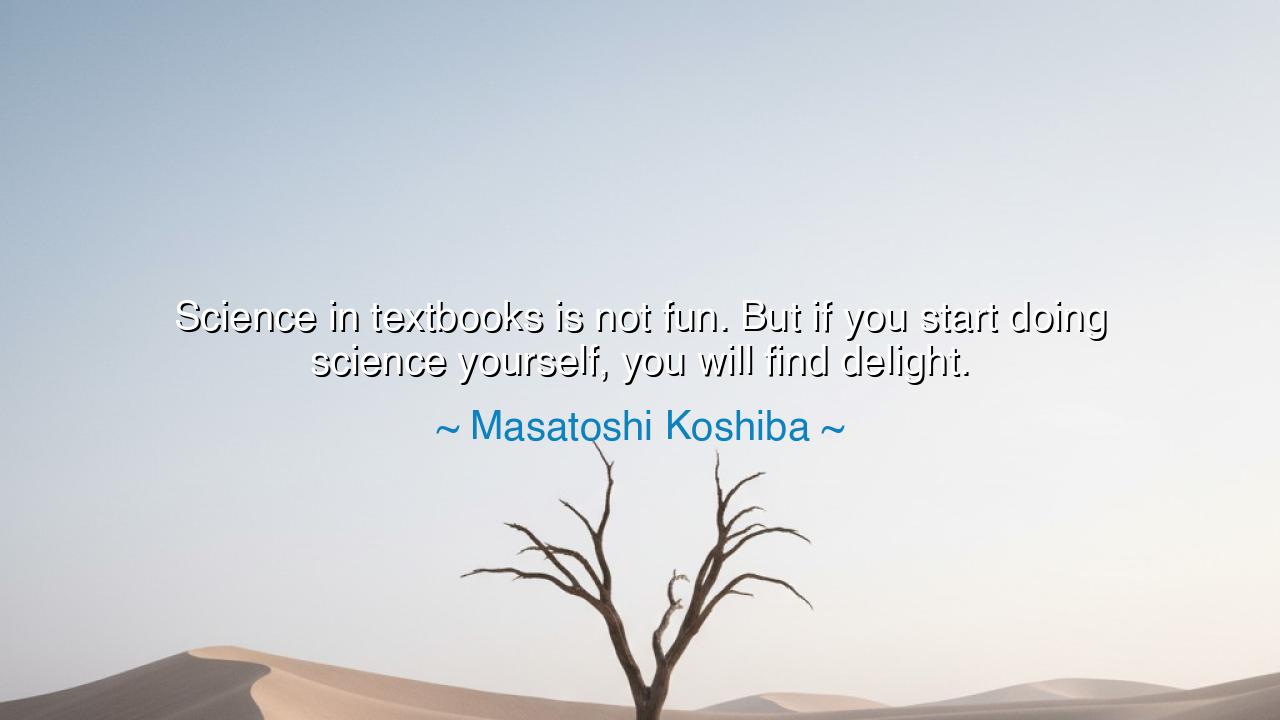
Science in textbooks is not fun. But if you start doing science
Science in textbooks is not fun. But if you start doing science yourself, you will find delight.






Hear the wise and spirited words of Masatoshi Koshiba, the seeker of neutrinos and Nobel laureate: “Science in textbooks is not fun. But if you start doing science yourself, you will find delight.” In this short saying lies a river of truth: knowledge written in pages is but shadow, while the living act of discovery is flame. He speaks as one who touched the mysteries of the cosmos, not through passive reading, but through daring experiments that unveiled the unseen.
The meaning is profound. Textbooks are necessary; they preserve the wisdom of generations, the distilled results of centuries of inquiry. But they are like maps of distant lands. To read a map is useful, but to walk the terrain, to climb the mountain, to cross the river—that is where the soul awakens. Koshiba reminds us that the delight of science comes not from memorizing facts, but from doing, from engaging directly with the unknown, from testing, building, observing, and finally glimpsing truth with one’s own eyes.
The origin of this wisdom lies in Koshiba’s own life. As a physicist, he ventured into realms unseen by ordinary senses. He designed experiments deep underground to catch the fleeting traces of neutrinos, ghostly particles passing through matter almost without trace. To read of neutrinos in a textbook might stir curiosity, but to build the detector, to wait in patience, and at last to see the faint evidence of their passage—that was delight beyond measure. He spoke not as a theorist of abstractions, but as a man who had tasted the thrill of discovery.
History too affirms this truth. Think of Galileo, who could have read Aristotle endlessly in dusty halls, but instead turned his telescope to the heavens and saw the moons of Jupiter circling their planet. That moment of doing science shattered centuries of error and filled him with awe. Or recall Marie Curie, who did not find joy in textbooks alone, but in the long hours of labor in her laboratory, coaxing the hidden radiance of radium and polonium from common ore. For her, the true delight was not in words, but in touching the unseen powers of nature with her own hands.
The danger lies in mistaking knowledge for wisdom, or reading for experience. A mind filled with memorized laws but untouched by the spirit of discovery grows weary, lifeless, and uninspired. Students who see science only as rote learning often find it dull, even oppressive. But once they taste the adventure of experimenting—watching reactions unfold, measuring stars, building machines—they find wonder awakens within them. Koshiba warns us not to let science be entombed in books alone, but to set it free in action.
The lesson for us is clear: seek delight not only in the learning of others but in the living practice of your own. Read the words of the wise, but then rise from the page and test the truth yourself. For only when knowledge is joined with experience does it become living wisdom. The joy of discovery, the thrill of invention, the awe of understanding—these belong not to the passive reader but to the active seeker.
Practical action flows from this truth. If you are a student, do not stop at textbooks—perform experiments, build projects, ask questions that demand more than memorization. If you are a teacher, bring science alive, so that young minds may feel its wonder. If you are grown, still seek experiments in daily life, for curiosity does not end with age. Above all, embrace the spirit of doing, for it is there that the fire of delight burns brightest.
Take this as a guiding flame: “Science in textbooks is not fun. But doing science brings delight.” Let this wisdom remind you that true joy lies not in words about the world, but in stepping into the world itself, touching it, questioning it, and discovering its secrets with your own hands. For in that sacred act of seeking, you become not only a student of nature, but a participant in her eternal unfolding.






AAdministratorAdministrator
Welcome, honored guests. Please leave a comment, we will respond soon